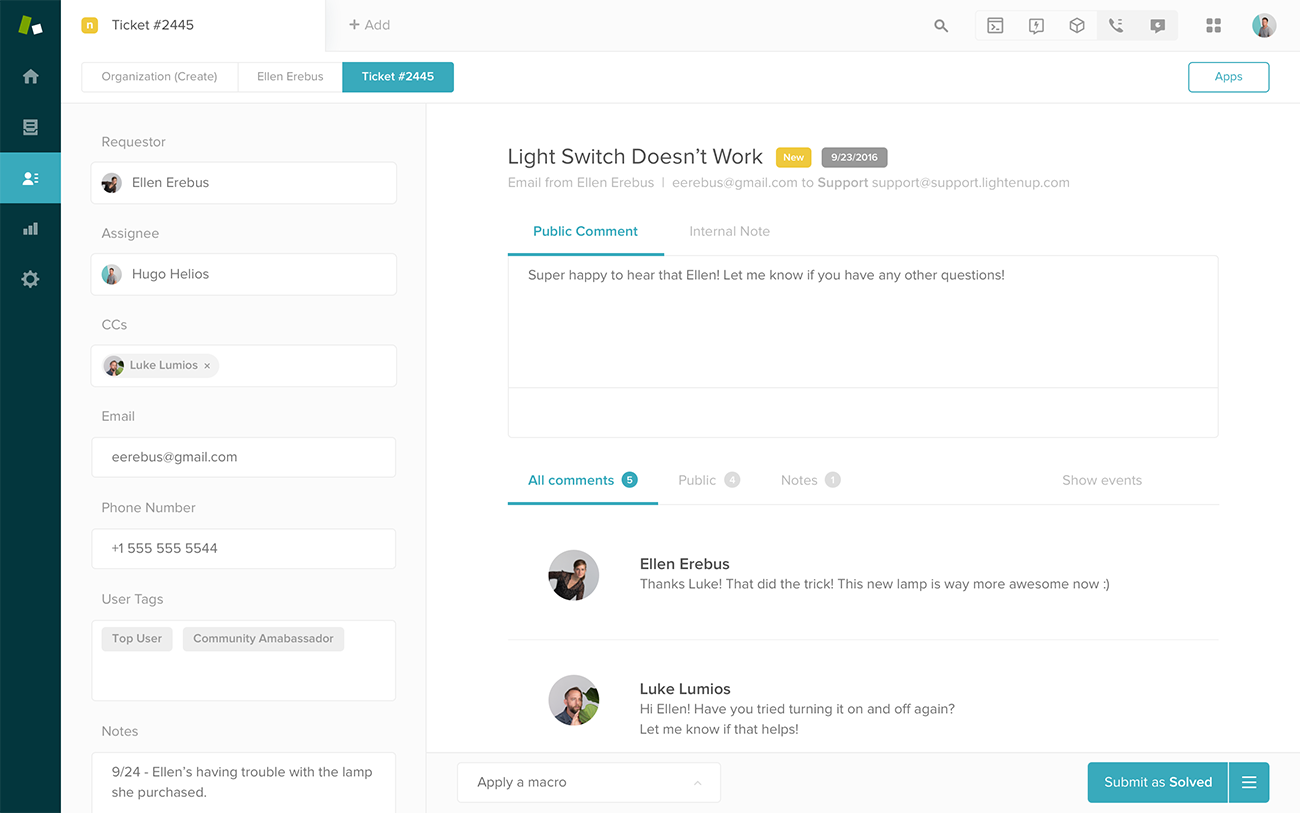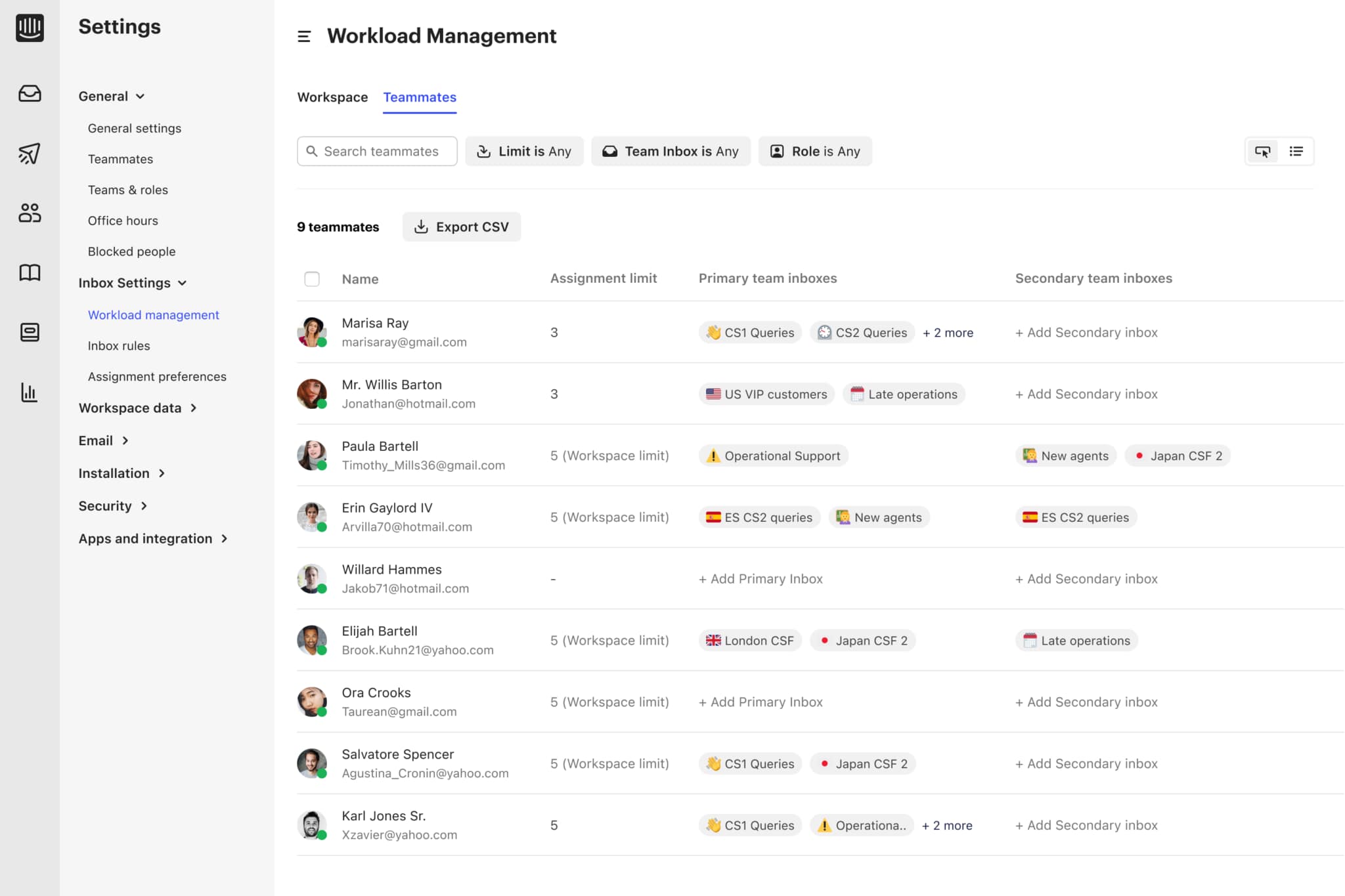In today's fast-paced business environment, customer support has become a critical factor in determining a company's success. With more and more help desk systems released, finding one can be challenging. On one side, you have a bunch of budget offerings, whereas on the other, refined premium tools mean business and only.
Two standout contenders in the premium segment are Intercom and Zendesk. These powerhouse platforms have been battling for supremacy in the help desk software arena for years, constantly innovating and expanding their feature sets. Both share a lot in common, and both try to compete with one another for the throne. Frankly, they come very close. Yet, which one is for you? Is Intercom or Zendesk the one who will power your business operations? Let’s find out!
Let's meet the contestants
As businesses grow and customer expectations evolve, the choice between Intercom and Zendesk becomes increasingly crucial. Both platforms offer robust solutions capable of handling high-volume customer interactions, but their approaches and specializations differ. Zendesk is renowned for its scalability and user-friendly interface, while Intercom is celebrated for its focus on customer engagement and personalized communication.
In this in-depth comparison, we'll dive into the nuances of each platform, exploring their key features, pricing structures, and overall value propositions. Whether you're a growing startup looking to upgrade your customer support infrastructure or an established enterprise seeking to optimize your help desk operations, this analysis will help you determine which solution—Intercom or Zendesk—is best suited to power your business operations and take your customer service to the next level.
Join us as we unpack the strengths and weaknesses of these industry front runners, providing you with the insights needed to make an informed decision for your organization's unique needs and goals.
Zendesk
Let’s explore Zendesk, one of the most established and versatile help desk platforms available today. Launched in 2007, Zendesk has grown into a behemoth in the customer support industry, serving global giants such as Uber, Adobe, and Vodafone. These industry leaders rely on Zendesk not just for its robust features but also for its proven ability to support the complex needs of multi-billion-dollar enterprises.
With customers such as Uber, Adobe, and Vodafone under their belt, Zendesk has established itself as a premium help desk solution capable of handling huge, multi-billion-dollar companies.

Ticket in Zendesk. Source: Zendesk
Key Strengths of Zendesk
- Scalability and Stability: One of Zendesk’s standout features is its focus on scalability and operational stability. The platform is designed to grow with your business, regardless of size. Whether you're a small startup or a large corporation, Zendesk's tiered pricing plans ensure that you always have the option to scale your support operations seamlessly. This flexibility is vital for businesses anticipating growth or seasonal fluctuations in customer inquiries.
- Feature Integrity: Zendesk is renowned for its commitment to delivering features that work as promised right out of the box. The development team prioritizes releasing fully functional, reliable features, ensuring that every tool you use performs exactly as expected. This level of reliability is particularly important for businesses that depend on their help desk software to maintain high customer satisfaction.
Another critical aspect of Zendesk is its user-friendly design. Navigating through toggles, menus, and user management settings is intuitive and straightforward, making it easier for your team to focus on providing excellent customer support.
- Comprehensive Help Desk Functionality: Zendesk offers a complete suite of help desk tools, making it an all-in-one solution for managing customer support. Whether you need to handle tickets, generate detailed reports, or monitor performance through customizable dashboards, Zendesk has you covered. Moreover, the platform is continuously evolving, with a strong focus on AI chatbots and self-service options—technologies quickly becoming essential for modern customer service.
Intercom
Intercom stands out in the customer support landscape with its unique approach to customer engagement and personalized communication. Unlike traditional help desk platforms, Intercom combines messaging, automation, and proactive support features, making it an excellent choice for businesses that prioritize customer interaction.
Intercom has gained a reputation as the go-to platform for companies that want to excel in customer engagement. By focusing on personalized communication, Intercom helps businesses create meaningful connections with their customers.

Workload management in Intercom. Source: Intercom
Key Strengths of Intercom
- Customer Engagement Focus: Intercom is designed to facilitate ongoing customer conversations rather than just managing support tickets. This approach allows businesses to engage with their customers in a more personalized manner, building stronger relationships and enhancing customer loyalty. The platform supports various communication channels, including live chat, email, and in-app messaging, ensuring that you can reach your customers wherever they are.
- Proactive Support with Custom Bots: One of Intercom's standout features is its custom bots, which can be tailored to handle specific tasks, such as answering common customer questions, collecting leads, or guiding users through your product. These bots are not only versatile but also capable of learning and improving over time, making them a powerful tool for automating routine tasks and providing proactive support.
Intercom’s custom bots can be integrated seamlessly into your website or app, helping you automate interactions without sacrificing the personal touch that customers appreciate.
- Unified Inbox: Intercom's unified inbox is another feature that sets it apart. This tool allows your team to manage all customer interactions from a single place, whether they're coming from live chat, email, or social media. This centralized approach streamlines your support operations, making it easier to track and respond to customer inquiries quickly.
- Customer Data Insights: Intercom also offers robust analytics and reporting tools that provide deep insights into customer behavior and interaction history. This data-driven approach helps businesses understand their customers better, identify trends, and make informed decisions to improve their support strategies.
Key Features
Now that we've covered the basics, let's dive into the unique and exclusive features that set these platforms apart. In this section, we'll not only describe the main features but also explore how they can be practically applied within your company. Our goal is to present the real-life value these features offer, so let’s get started!
Zendesk
As before, we'll begin with Zendesk. One of the standout features of Zendesk is its Satisfaction Prediction module.
The core idea behind this system is to provide a deeper and more accurate understanding of your customer satisfaction and conversion rates. During customer interactions, the Satisfaction Prediction module evaluates the conversation in real-time, allowing you to adjust and steer the dialogue in a more positive direction if needed. This proactive approach can be crucial in retaining customers and improving overall satisfaction.
Key Benefits of Satisfaction Prediction:
- Real-Time Interaction Insights: The system continuously monitors conversations and can rate interactions on the fly, simplifying and speeding up the review process. This immediate feedback is invaluable for customer service teams looking to maintain high-quality interactions.
- Predictive Response: By analyzing the conversation's tone and content, the module can alert you when a conversation will likely take a negative turn, enabling your team to intervene before the issue escalates. This helps maintain positive customer relationships and can significantly reduce churn.
- Customizable Rules: You can set up specific rules within Zendesk to automatically flag or respond to situations where customer satisfaction is at risk. This automation lets your team focus on critical issues without missing a beat.
- Enhanced Analytics with Zendesk Explore: Pairing Satisfaction Prediction with Zendesk Explore provides even deeper insights, helping you refine your approach and make data-driven decisions to enhance customer interactions further.
This feature is particularly beneficial for smaller businesses that handle a steady stream of customer inquiries or those targeting niche markets where customer satisfaction is paramount. However, it's important to note that the Satisfaction Prediction module is only available on the Enterprise plan.
Intercom
Turning our attention to Intercom, one feature that really stands out is its Custom Bots and automation capabilities. These aren't just simple chatbots; Intercom's bots are highly customizable and capable of handling a wide range of tasks, making them an essential tool for modern customer engagement.
Key Features of Intercom Custom Bots:
- Versatile Integration: Intercom's bots can be integrated across various platforms, including websites, mobile apps, and social media channels. This flexibility ensures that your support system is always within reach, providing timely and accurate responses to customer inquiries.
- Task Automation: Intercom bots are not only for answering questions; they can be programmed to perform tasks such as qualifying leads, collecting customer feedback, or even processing simple transactions. This automation significantly reduces the workload on your support team, allowing them to focus on more complex and valuable customer interactions.
- Personalized Conversations: One of the key strengths of Intercom's bots is their ability to engage in personalized conversations. By leveraging customer data, these bots can deliver tailored responses that resonate with the user's specific needs and preferences, enhancing the overall customer experience.
- Advanced Analytics: Intercom also provides robust analytics tools that help you track the performance of your bots and optimize their interactions. These insights allow you to continually refine your automation strategies, ensuring that your bots are always delivering maximum value.
Overall, Intercom’s focus on customer engagement, combined with its powerful automation features, makes it a formidable choice for businesses looking to deepen their customer relationships while optimizing their support operations. Whether you’re a growing startup or a large enterprise, Intercom’s innovative approach can help you maintain a high level of service while scaling your business efficiently.
Both Intercom and Zendesk offer comprehensive features and continue to innovate. However, as these platforms evolve, pricing becomes a key differentiator, and this is where the competition heats up. We compared the top-tier plans of each platform to evaluate which offers the best value. Why focus on the premium plans? The advanced tools and features we've highlighted are typically accessible only at these higher subscription levels. Let's break it down in the figure below.
| Intercom: Premium Plan $119/a/m | Zendesk: Enterprise Plan $99/a/m |
| Custom Bots | Multilingual content |
| Product Tours | CSAT surveys |
| Resolution Bot | Advanced analytics powered by Zendesk Explore |
| Conversational AI | Satisfaction Prediction |
| Inbox Customization | Skills-based routing |
| Task Automations | Multibrand support |
| Custom Reports & Dashboards | Contextual workspaces |
As the table shows, both tools offer a broad range of features with significant overlap. However, considering pricing, Zendesk provides a slightly more affordable option. That said, Intercom's pricing reflects its strong emphasis on conversational customer experiences. Ultimately, the right choice will depend on your specific needs and how each platform aligns with your business goals.
Final Notes
When choosing between Zendesk and Intercom, it’s clear that both platforms stand out, each offering a robust suite of features designed to enhance customer engagement. Zendesk, with its solid reputation and focus on enterprise-level scalability, is ideal for larger organizations needing deep analytics and predictive tools like those found in Zendesk Explore.
Conversely, Intercom excels in its focus on conversational experiences, making it a perfect fit for companies looking to engage with customers across multiple channels seamlessly. Its advanced AI capabilities and customizable inbox ensure that teams of all sizes can manage customer interactions efficiently.
Both platforms are committed to improving customer service, and each brings unique strengths to the table. The decision between Zendesk and Intercom ultimately hinges on your company’s specific needs, budget, and future aspirations.
To make an informed choice, we recommend trying out both platforms through their free trial offerings. This hands-on experience will let you explore their interfaces, test features, and see how well they integrate with your existing workflows. By doing so, you’ll gain valuable insights into which platform feels more intuitive and aligns better with your team's needs.
Remember, the best help desk solution is one that not only addresses your current needs but also scales as your business grows. So take the time to explore, experiment, and select the platform that will empower your team to deliver outstanding customer service.



